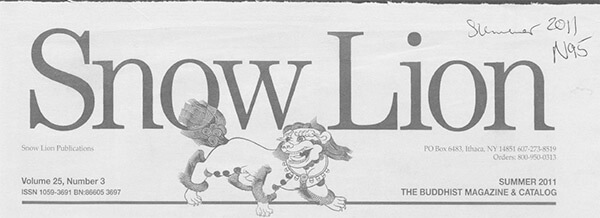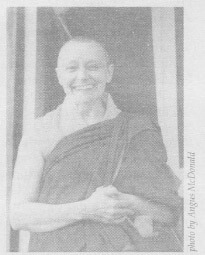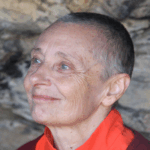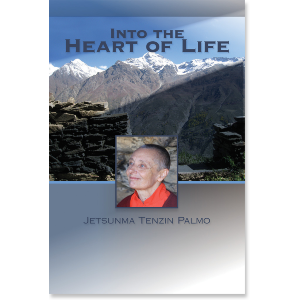| The following article is from the Summer, 2011 issue of the Snow Lion Newsletter and is for historical reference only. You can see this in context of the original newsletter here. |

An Interview with TENZIN PALMO
Although Jetsunma Tenzin Palmo's international bestseller Cave in the Snow chronicled her twelve years of seclusion in a remote cave, her new book Into the Heart of Life offers a very down-to-earth guide for spiritual practice right here, right now, no cave required. In this interview with Snow Lion's Jeff Cox, she touches on some of the topics in her book: the effect of being around a teacher, how not grade ourselves on our practice, and other issues relevant for practitioners.

Jeff Cox: When people come to see you—and there are many, intrigued that you, a Western woman, spent twelve years meditating alone in a Himalayan cave—what do you most want to convey to them?
Jetsunma Tenzin Palmo: I want to show them how Buddhism is like yeast that raises the heavy dough of everyday life to become light and nourishing. This is the challenge—East and West—to present dharma as wonderfully relevant to everyday life. Buddhism allows for a lot of investigation and questioning—I often speak of dharma as enlightened common sense. Most of the dharma is like that—you say it and most of the people think, Yes, that is right. Then they feel motivated to investigate further and apply the teachings.
JC: Your new book, Into the Heart of Life, so beautifully lays out how to make everyday life into a dharma path. It's tremendously encouraging and useful, as most of us cannot spend years in retreat.
JTP: The people who come to my talks are people who have a very full life. They are saying to themselves, Despite my full life, I still feel incomplete. How can I take my life as it is and do something meaningful with it? What I try to convey is that the things that traditionally were once seen as obstacles to dharma practice―family, profession, social life―can be transformed into our practice.
Buddhism deals with this relative reality in which our ego is trapped. It helps to make the ego into a friendly, happy ego―before we annihilate it all together.
JC: A well-adjusted ego is a good thing.
JTP: Yes, the Buddha taught that in order to do shamatha meditation you need a well-balanced sense of self. Then you can go on to vipassana, which is to see through the machinations of the self. To take apart the ego you need balance. A balanced self is one that is not completely dominated by the three poisons (ignorance, desire, anger), is good-hearted, kind, and calm―not neurotic―and thereby able to have a foundation of tranquility and one-pointedness in meditation.
JC: Once one has a glimpse of the true nature of self, then one can more easily shift away from engagement with form, feeling, perceptions, and impulses as who one is. But I notice that some people think of awareness as impersonal and not really alive.
JTP: That is because they haven't experienced it. It is the one time that one really becomes alive. It is the one time that we truly wake up. What we consider waking consciousness is, from the standpoint of awakened consciousness, still a dream state. The egoistic consciousness is by its nature dualistic and separates us from everything, leaving us feeling cold.
Pure awareness connects us with everything. Everything vibrates with intelligence and consciousness. And that is why, spontaneously, compassion arises. Because we recognize that all of us in our heart of hearts are seeking that sense of well-being and connection but we are alienated from our true nature so we suffer. We don't recognize our true potential and we are living at a lower level—we are all alienated from who we really are and we are identified with who we are not. This is tragic.
JC: Yes, it leaves us feeling like something is always wrong and we don't know what that is.
JTP: Exactly. When one is resting in pure awareness, then everything clicks into place. It is as if your lens came into focus and you see clearly. It radiates through one's whole being. When you meet great beings who are in a state of awareness, every action they perform, which from their side is open and spontaneous, from our side seems to be completely perfect. Even their simple actions are full of meaning for us; from their side these are the natural expression of their luminous consciousness.
JC: Their actions are not calculated.
JTP: They are not calculated at all, yet perfect. This is why we like to be in the presence of enlightened masters. It is a blessing—our human potential is being mirrored back to us.
JC: When we are in their presence our minds are harmonized with theirs and we can taste a hit of the qualities that you are describing.
JTP: Exactly. It is worth striving for!
JC: Is it possible, because true nature is present here and now―though covered over―that this can show up unexpectedly even though we have not gone through the same extensive training as the great masters we admire?
JTP: Usually we get glimpses into the nature of mind when we are not expecting them. As long as one strives and makes getting a glimpse into a goal, one will never achieve it. It is when the ego relaxes and is not interested in gaining anything that these glimpses spontaneously occur. The problem then is that the ego grasps at it as its own accomplishment. It then seeks to reproduce the experience. The trouble is, so long as the ego is in charge, a glimpse is not going to reoccur. This is why in mahamudra and dzogchen there is such an emphasis on relaxing and not striving to achieve. Often when people first start to meditate they don't have specific expectations, and then they get a very powerful experience. Then they spend the next twenty years trying to reproduce it.
JC: Sometimes I also think that these early experiences reinstate past development into one's present life.
JTP: Yes, that too.
JC: I also notice that any little experience can be so inflating and one feels so good about one's achievement whereas what one experienced was more like not being in the way.
JTP: I think it is very important not to judge one's meditation practice in terms of good or bad. You just do it and how it is how it is. Judging our meditations one way or another just keeps us trapped in the same old process. If the mind is distracted, it is distracted—tomorrow it may be distracted or maybe not. So what. This attitude fosters acceptance. You are working towards something but doing it without a lot of judgment.

To take apart the ego you need balance.
JC: On another point, when you speak of the process of increasing awareness in Into the Heart of Life, do you mean we need to increase the amount of attention that we place on awareness?
JTP: Yes, we need to pay more attention to awareness and less on the discursive process. Normally our minds just go on and on and we are lost in the thoughts. As awareness increases, thoughts part, like clouds in the sky. Then you get a glimpse of the clear, spacious nature of awareness.
This is why the Buddha taught the four foundations of mindfulness. It doesn't matter which one you choose to practice. The Tibetans choose to focus on mind, on how the thoughts work, on who is thinking. Goenka chooses to teach mindfulness of sensations; the Burmese focus on breath and walking. Once we put our attention on the object of mindfulness, we begin to see that it is not solid and enduring; it is momentary and flowing and not who we are. And the ego, which seems so much at the center of our universe―when you look for it, it is gone―you can never find it.
JC: The skandha referred to as impulses we normally think of as our will. When you look carefully at the process of willing can you say that it is really just a process of impulses arising and moving into action?
JTP: And it is often very habitual, like Pavlov's reflex response. In mindfulness training, everything is slowed down so one becomes conscious of that link between the impulse and the action. Once you are conscious of this linking, you can choose which way to go.
JC: And you cannot loosen your identity with these processes without that strength of awareness, as you put it?
JTP: All Buddhist schools understand that. It is amazing when you think about all the years that the various Buddhist schools have been separate that they are still so similar in their basic view. People have passed on the tradition with very little impulse to innovation, as is true in traditional societies, and they have passed it on purely. And, of course, the system works!
JC: Is there anything else that you would like to share with our readers?
JTP: I am quite impressed with how sincere Buddhists in the West are. In the West, when people think of Buddhism, they think of meditation, but in the East only a small minority of Buddhists ever meditate.
And it is only a small minority who actually practice, even among monks. They recite mantras and so forth. For most, the power of the mantra is enough; they may not be doing the visualizations and everything that goes along with it. We should not idealize or romanticize what is going on in the Buddhist world in Asia. Westerners are much more interested in meditation and many more are making progress in meditation than the average Asian. Except perhaps in Burma.

Judging our meditations one way or another just keeps us trapped.
JC: Yes. 1 have noticed that some people think that everyone in a monk's robe is a Buddha.
JTP: Yes. Well, just stick around and you will find out.
JC: On the other hand, I am starting to think that everyone in a nun's robe might be! I love to receive your newsletter with the pictures of your nuns because they seem so bright and illumined with their practice.
JTP: Yes, since nuns were deprived for so many centuries, now that they have opportunities to grow intellectually and spiritually they are so much more conscious of the advantages they have been given. We have hopes for them. The monks have the advantages all ready and that is wonderful―and may they have these for a long time. But now it is time for the nuns to also have a chance.


